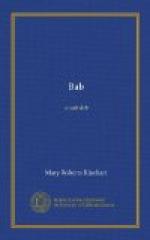Dear Dairy, I am tired and my head aches. I cannot write it all. He was perfectly respectfull, and only his eyes showed his true feelings. The woman who is the Adventuress in the play came to the Door, but he motioned her away with a waive of the hand. And at last it was over, and he was asking me to come again soon, and if I would care to have one of his pictures.
I am very sleepy tonight, but I cannot close this record of a w-o-n-d-e-r-f-u-l d-a-y——
January 24th. Cold worse.
Not hearing from Carter Brooks I telephoned him just now. He is sore about Beresford and said he would not come to the house. So I have asked him to meet me in the Park, and said that there were only to more days, this being Thursday.
Later: I have seen Carter, and he has a fine plan. If only father will do it.
He says the Theme is that the world owes Adrian a living, and that the way to do is to put that strongly before the people.
“Suppose,” he said, “that this fellow would go to some big factery, and demand work. Not ask for it. Demand it. He could pretend to be starving and say: `The world owes me a living, and I intend to have it.’”
“But supose they were sorry for him and gave it to him?” I observed.
“Tut, child,” he said. “That would have to be all fixed up first. It ought to be aranged that he not only be refused, but what’s more, that he’ll be thrown out. He’ll have to cut up a lot, d’you see, so they’ll throw him out. And we’ll have Reporters there, so the story can get around. You get it, don’t you? Your friend, in order to prove that the idea of the Play is right, goes out for a job, and proves that he cannot demand Laber and get it.” He stopped and spoke with excitement: “Is he a real sport? Would he stand being arested? Because that would cinch it.”
But here I drew a line. I would not subject him to such humiliation. I would not have him arested. And at last Carter gave in.
“But you get the Idea,” he said. “There’ll be the deuce of a Row, and it’s good for a half collumn on the first page of the evening papers. Result, a jamb that night at the performence, and a new lease of life for the Play. Egleston comes on, bruized and battered, and perhaps with a limp. The Labor Unions take up the matter—it’s a knock out. I’d charge a thousand dollars for that idea if I were selling it.”
“Bruized!” I exclaimed. “Realy bruized or painted on?”
He glared at me impatiently.
“Now see here, Bab,” he said. “I’m doing this for you. You’ve got to play up. And if your young man won’t stand a bang in the eye, for instanse, to earn his Bread and Butter, he’s not worth saving.”
“Who are you going to get to—to throw him out?” I asked, in a faltering tone.
He stopped and stared at me.
“I like that!” he said. “It’s not my Play that’s failing, is it? Go and tell him the Skeme, and then let his manager work it out. And tell him who I am, and that I have a lot of Ideas, but this is the only one I’m giving away.”




